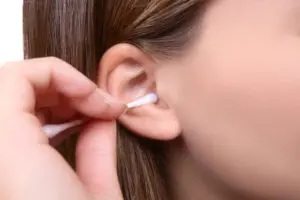A ruptured eardrum can be quite painful, or you may not even realize it has happened. Nevertheless, it is not something to take lightly or ignore as a ruptured or perforated eardrum can have some serious complications.
How Will I Know If My Eardrum Has Ruptured?
In some cases a quick excruciating pain may signal a perforated eardrum. In other cases an earache may suddenly go away. Other telltale signs of a ruptured eardrum include:
- Drainage from the ear including blood, pus, or a clear liquid.
- Sudden hearing loss
- Vertigo
- Nausea
- Tinnitus
- Facial abnormality
Common Causes of a Ruptured Eardrum
A ruptured or perforated eardrum is not that rare, and it can happen while doing even the most normal of activities.
1. Injury or Trauma to The Ear or Head
Sports injuries to the ear, or any sort of blow to the head are both likely causes for a ruptured eardrum.

We risk a ruptured eardrum every time we put an instrument into our ears like a cotton swab for cleaning. More than one half of all patients who visit our practice use cotton swabs on a regular basis, making this a common problem.
Children find all sorts of objects to insert into their ears including pens, sticks, and toys. Parents should be especially vigilant and take their child to see an ENT doctor to be evaluated should anything become lodged in their little one’s ear.
2. Infections
With an ear infection, fluid builds behind the eardrum and as it increases, so does the pressure. This is again very common in children.
Many ear infections can lead to the formation of a very small perforation, but should be treated with a prescribed antibiotic or over-the-counter pain medication to avoid permanent damage. Ask your doctor for a hearing test to determine if there has been any hearing loss.
3. Pressure Changes
When the pressure inside your ear is very different from the pressure outside the ear, this can cause a perforation or rupture.
Sports enthusiasts who enjoy scuba diving or skydiving are at a particularly high risk of affecting the health of their eardrums and overall hearing. Even traveling on a plane can negatively impact your ears due to the unavoidable changes in the cabin pressure.
If you spend a lot of time driving in high altitudes, this can also cause a ruptured eardrum.
Treatment and Remedies
Seek treatment from an ENT specialist like Dr. David Oliver if you suspect you may have a ruptured eardrum. As mentioned previously, some small perforations may slowing heal on their own within 3 months, but you should still seek an exam to determine the extent of the damage and find out if surgery may be needed. Serious complications can occur if left untreated.
Instead of using cotton swabs for cleaning your ears, try a simple mix of vinegar and water once per week using 4 or 5 drops in each ear to keep your ears clear of wax.
Request an Eardrum Consultation Today!
If you suspect you have injured your eardrums, contact Coastal Ear, Nose & Throat for an exam as soon as possible.
